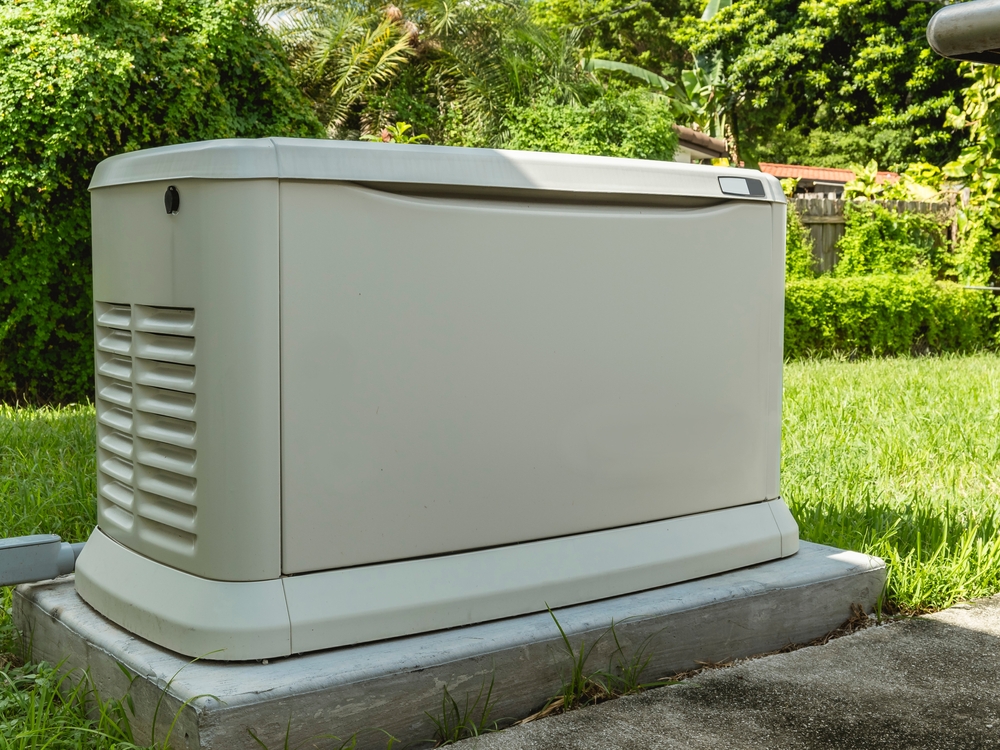When you consider all the tasks you need to complete in a day, it should come as no surprise that we rely on electricity to power nearly every aspect of our daily lives. From the lights that brighten our homes to the appliances that keep our food fresh, we’ve become so accustomed to the constant supply of power that we hardly notice it — until the electricity goes out. Power outages can be incredibly disruptive, leading to inconveniences like losing light, heat, and access to the internet and entertainment. In more severe cases, extended blackouts can even pose dangers, threatening the safety and security of our homes and families.
Fortunately, home generators can help maintain power and restore normalcy when the grid goes down. A home generator is a backup power source that automatically kicks in when utility power is interrupted, ensuring that essential systems and appliances remain operational. But while generators can be incredibly useful, they also come with some drawbacks that you need to keep in mind.
This guide will explore the pros and cons of home generators to help you determine if investing in one is the right choice for your household.
How Does a Home Generator Work?
At the most basic level, a home generator is a self-contained power plant that generates electricity. When the power goes out, the generator automatically senses the loss of utility power and starts up, providing backup electricity to pre-selected circuits or your entire home. Natural gas, propane, or diesel fuel powers the generator’s engine, which in turn spins an alternator to produce electricity.
Pros of Home Generators
From keeping your food fresh to maintaining a comfortable home environment, home generators can be a true lifesaver during power outages. Here’s a closer look at the many pros of home generators:
Peace of Mind During Outages
One of the primary benefits of a home generator is the peace of mind it provides during a power outage. With a generator, you don’t have to worry about the loss of essential functions like lighting, heating/cooling, and refrigeration. This ensures your family remains comfortable and safe, even when the grid goes down.
Reduced Food Spoilage
Power outages can be especially problematic for homeowners with stocked refrigerators and freezers, as the loss of electricity can lead to thousands of dollars worth of spoiled food. A generator prevents this by keeping your fridge and freezer running, preserving the freshness and value of your perishable goods.
Keeping Medical Equipment Powered
For households with members who rely on medical equipment like oxygen concentrators, CPAP machines, or nebulizers, a generator can be a literal lifesaver during an outage. By maintaining power to these critical devices, a home generator ensures your loved ones can continue to access the care they need, even when the electricity is out.
Security System Functionality
Your home’s security system is another essential that can be compromised during a blackout. With a generator, however, your alarm system, video cameras, interior and exterior lights, and other security features will remain operational, deterring potential break-ins and safeguarding your property.
Continued Operation for Essential Appliances
Beyond just keeping the lights on, a home generator allows you to continue using important appliances like washing machines, sump pumps, and well pumps. This helps you maintain a sense of normalcy and avoid the disruption that can come from being unable to do laundry or pump water from your basement.
Cons of Home Generators
While home generators offer numerous benefits, there are also some downsides to consider. Understanding the potential drawbacks can help you make an informed decision about whether a whole-house generator is right for your space. Take a closer look at the cons of home generators:
High Installation Cost
When considering upgrading their living spaces, many people wonder, “How much do home generators cost anyway?” The answer, unfortunately, may surprise them. One of the primary drawbacks of a home generator is the significant upfront cost. The average price of a whole-home generator can range from $5,000 to $20,000, including installation. This price tag may put generators out of reach for some homeowners, especially those on a tight budget.
Regular Maintenance Needs
Generators require ongoing maintenance to ensure they function properly when needed. This includes regularly scheduled tune-ups, oil changes, and inspections — tasks that come with both time and financial investments. Neglecting home generator maintenance can lead to breakdowns and failures when you need the backup power most.
Noise Pollution
Home generators, particularly larger models, can produce significant noise that may disturb your household or bother neighbors. The constant hum of a running generator can be a nuisance, especially if it’s located near outdoor living spaces or bedroom windows.
Environmental Impact
Generators rely on fossil fuels like natural gas, propane, or diesel to generate electricity. This means they contribute to greenhouse gas emissions and have a larger environmental footprint compared to grid-supplied power or renewable energy sources.
Consider Installing a New Generator
Ultimately, the decision to invest in a home generator comes down to the specific needs of your household. If you live in an area prone to frequent or lengthy power outages, need to power medical equipment, or simply want the peace of mind that comes with backup power, a generator could be a worthwhile investment.
No matter what you decide, it’s always a good idea to reach out to the experts at Saffer Plumbing, Heating & Electrical to discuss your options and get expert guidance on weighing the pros and cons of a home generator. Our professionals will also ensure your generator is properly sized and installed for your home. With our team by your side, you can make an informed decision that keeps your family safe, comfortable, and secure, even when the grid goes down. Contact us today to learn more about installing a generator!

